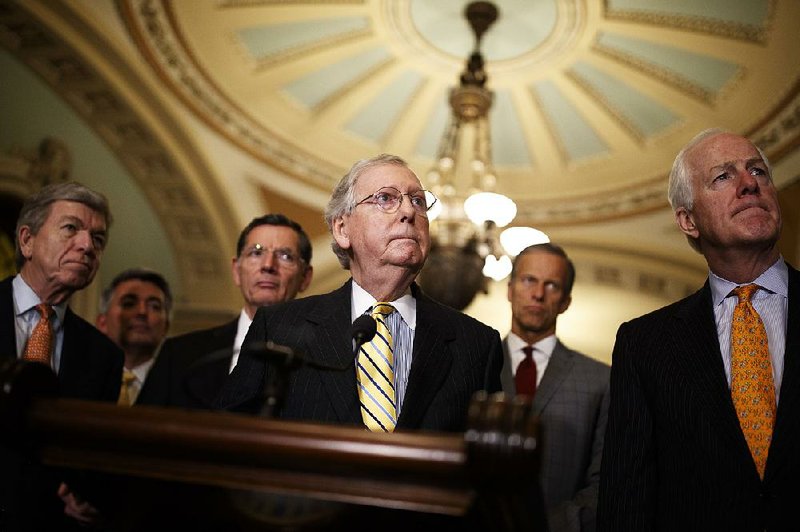WASHINGTON -- The Senate will cancel most of its annual August recess, Majority Leader Mitch McConnell told senators Tuesday, an election-year move that will force Democrats to shuffle their campaign schedules.
The Senate will now recess for one week in August instead of four, said McConnell, R-Ky. McConnell said he decided to shorten the usual summer getaway "due to the historic obstruction by Senate Democrats of the president's nominees" and to work on must-pass spending bills.
His decision has been widely anticipated in the Senate Republican Conference. Some GOP senators sent a letter to McConnell last month urging him to keep the chamber in session to vote on nominations and legislation, and Senate leaders have said the appetite to stay in town has grown in their ranks.
"We have a lot of important work to do," McConnell said.
McConnell said that to make progress on spending bills and nominations, "it's necessary for us to be here in August and to do our work."
The additional workweeks in August mean that endangered Democratic senators on the ballot this year will face a dilemma: Stay in Washington and attend to Senate business during time they could otherwise use to campaign back home or remain in their states and face criticism that they are shirking their responsibilities in government.
The new schedule could also enable their Republican challengers -- many of whom hail from the private sector or state government -- to have the states to themselves during the late-summer stretch.
The House still plans to be out of session for the month of August.
Democrats are defending 26 Senate seats this year, including two represented by independents in Vermont and Maine, and 10 in states Donald Trump won in 2016. Republicans have nine incumbents on the ballot.
The new August schedule is problematic for one vulnerable Republican: Sen. Dean Heller of Nevada, who is facing re-election in a state Hillary Clinton won in 2016.
Republicans are working with a narrow 51-49 majority as Sen. John McCain, R-Ariz., undergoes treatment for brain cancer in his home state. Democrats need only one senator to be present while the Senate is in session to object to Republican plans and make them go through procedural hurdles.
Senate Democratic leaders said they welcomed the additional time to address health care costs, including prescription drug prices.
"Working through August gives us the perfect opportunity to tackle this pressing issue of health care," said Senate Minority Leader Charles Schumer, D-N.Y.
"I think if we can actually get some things done for the American people, that's a good thing," said Sen. Chris Van Hollen of Maryland, the chairman of the Democratic Senatorial Campaign Committee.
In written statements, Arkansas' two U.S. senators voiced support for the move and blamed the minority party for the Senate's slow pace.
"We have a lot of work to do, much of which continues to be purposefully slowed down by delay tactics employed by Senate Democrats," said Sen. John Boozman, a Republican from Rogers. "The Appropriations Committee has been approving important pieces of legislation to fund our government, including my Military Construction-VA Appropriations bill, and I am pleased that Leader McConnell intends to put these bills at the top of the Senate's to-do list during this time."
Sen. Tom Cotton agreed.
"I commend Sen. McConnell for extending the summer legislative session in the face of unprecedented Democratic obstruction. Though August typically provides an opportunity to hear directly from Arkansans across the state, there's simply too much work left to do -- in particular, the Senate needs to fund our troops and confirm nominees to the courts and critical government offices," the Republican from Dardanelle said.
Conservative lawmakers and groups have been pressing McConnell to keep lawmakers in session to address nearly 150 federal judicial vacancies -- a number Democrats attribute to GOP delaying tactics during President Barack Obama's last years in office. McConnell said last month that he considers confirming judges his top priority.
Asked if his shortening of the recess was aimed at pressuring Democrats to halt delaying tactics against Trump's nominees, McConnell showed no willingness of reviving the break if the pace of nominations quickens.
"I hope we'll get greater cooperation, but everybody should anticipate that we will be here," he told reporters.
Information for this article was contributed by Sean Sullivan and Paul Kane of The Washington Post; by Alan Fram and Kevin Freking of The Associated Press; and by Frank Lockwood of the Arkansas Democrat-Gazette.
A Section on 06/06/2018
